一:boson是什么意思?
boson是一种粒子,属于量子场论中的基本粒子。它具有整数自旋,遵循泡利不相容原理,是构成物质的基本单位之一。
二:怎么读(音标)
[bəʊsɒn]
三:用法
boson主要用于量子场论和粒子物理学中,用来描述物质和能量之间的相互作用。它们可以通过玻色-爱因斯坦统计来描述,与费米子相对应。
四:例句1-5句且中英对照
1. The discovery of the Higgs boson in 2012 confirmed the existence of the Higgs field and completed the Standard Model of particle physics.
2012年希格斯玻色子证实了希格斯场的存在,并完成了粒子物理学的标准模型。
2. Bosons can have different properties, such as mass, charge, and spin, which determine their behavior in interactions with other particles.
玻色子可以具有不同的性质,如质量、电荷和自旋,这些性质决定了它们在与其他粒子相互作用时的行为。
3. Photons, gluons, and W and Z bosons are examples of gauge bosons that mediate the fundamental forces of nature.
光子、胶子以及W和Z玻色子是调控自然界基本力量的规范玻色子的例子。
4. The exchange of bosons between particles can result in the creation of new particles, such as electron-positron pairs.
粒子之间玻色子的交换可能会导致新粒子的产生,电子-正电子对。
5. Bosons play a crucial role in understanding the behavior of matter at a microscopic level and are essential to our understanding of the universe.
玻色子在理解微观层面物质行为中起着至关重要的作用,对我们理解宇宙也至关重要。
五:同义词及用法
boson的同义词包括:量子、基本粒子、规范粒子等。它们都是描述物质和能量之间相互作用的基本单位。在科学研究中,这些词语经常被交替使用。
六:编辑总结
boson是一种具有整数自旋的基本粒子,用于描述物质和能量之间相互作用。它们可以通过玻色-爱因斯坦统计来描述,并与费米子相对应。在粒子物理学和量子场论中发挥着重要作用,帮助我们更好地理解宇宙和物质世界。


